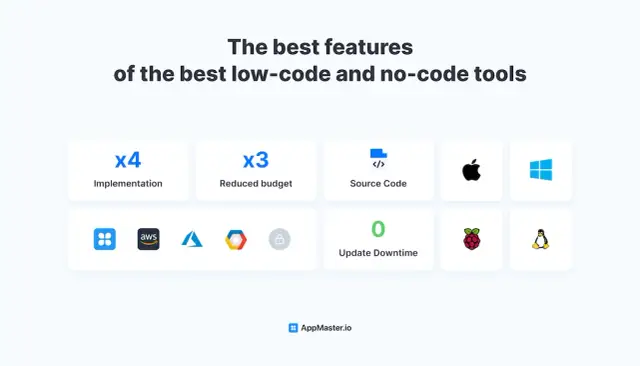Democratizing Development: How Citizen Developers are Shaping IT
Explore the growing trend of citizen developers and their influence on the IT industry, as well as the benefits, challenges, and implications it presents for businesses worldwide.

What are Citizen Developers?
Citizen developers are non-IT professionals who build software applications without extensive coding knowledge. They leverage no-code or low-code development platforms, which simplify the development process and enable individuals without specialized programming skills to create and maintain applications. These individuals often work in non-technical roles, such as sales, marketing, or operations, but possess enough technical aptitude to develop applications that can address specific business needs.
Citizen developers bridge the gap between the IT department and other areas of the business. By giving non-IT professionals the tools to design, build, and manage applications, organizations can foster innovation, improve collaboration, and reduce the burden on traditional software development teams. This empowers employees to address challenges and seize opportunities quickly, enabling companies to become more responsive to changing market conditions and customer demands.
Why Citizen Developers Matter
Citizen developers play a critical role in driving innovation, reducing the pressure on IT departments, and increasing the overall agility of a business. Here are some reasons why citizen developers matter in today's rapidly evolving tech industry:
- Speed: With the assistance of no-code and low-code development platforms, citizen developers can quickly develop and implement applications, allowing companies to be more agile and respond faster to changing market conditions.
- Democratization of development: By empowering non-technical employees to create applications without needing extensive coding knowledge, companies can unlock the potential of a wider talent pool and foster greater innovation.
- Collaboration: Citizen developers facilitate improved collaboration between business units and IT, breaking down traditional silos and ensuring better alignment between technology development and business goals.
- Reduced pressure on IT departments: With citizen developers creating applications to address specific business needs, IT departments can focus on more strategic, high-value initiatives rather than being bogged down by ad-hoc requests.
- Cost savings: By enabling non-IT employees to create applications, organizations can potentially save on software development costs and reduce reliance on external vendors or consultants. As the demand for digital transformation continues to grow, citizen developers will play an increasingly important role in shaping the IT industry and helping businesses remain competitive.
Rise of No-code and Low-code Platforms
No-code and low-code platforms have been pivotal in the rise of citizen developers. These platforms streamline the application development process, allowing users to quickly build and deploy applications without extensive programming knowledge.
No-code development platforms utilize visual, drag-and-drop interfaces to enable users to design and create software applications without writing a single line of code. These platforms are particularly appealing to non-technical users, as they can rapidly develop applications without significant barriers. Low-code development platforms, on the other hand, cater to a wider audience, including experienced software developers who seek a faster way to build applications. Low-code platforms still require some coding knowledge but simplify the development process by providing pre-built components, templates, and other tools to expedite application construction.
Both no-code and low-code platforms have gained popularity in recent years, driven by the increasing need for business agility, rapid application development, and digital transformation. These platforms enable organizations to address the growing technical skills gap, empowering non-technical employees to contribute to development efforts and drive innovation. As the capabilities of no-code and low-code platforms continue to advance, it is likely that the trend towards increased citizen development will only accelerate, transforming the software development and democratizing access to powerful development tools.

Benefits of Citizen Developers in the IT Industry
Citizen developers are revolutionizing the IT industry by allowing non-IT professionals to create applications and solutions independently. This growing trend offers several significant benefits, including:
Faster Application Development
With the rise of no-code and low-code development platforms, citizen developers are now able to create applications at a much faster pace than traditional software development methodologies. By bypassing time-consuming activities like writing and debugging code, citizen developers can rapidly prototype and launch applications, accelerating innovation and digital transformation within organizations.
Reduced Application Backlog
As businesses undergo digital transformation, demand for new applications often surpasses the capacity of IT departments to develop them. Citizen developers can play an essential role in easing the workload for professional developers, helping to reduce the backlog and enable IT departments to focus on more complex, mission-critical projects.
Cost Savings
Recruiting, training, and retaining skilled developers can be expensive and time-consuming. By empowering non-IT professionals to create applications with little or no coding expertise, businesses can realize significant savings on software development expenses. By leveraging the talents of existing staff, organizations can minimize the costs associated with hiring additional developers and reduce reliance on external consultants and contractors.
Innovation and Collaboration
Citizen developers help foster an environment of innovation by empowering individuals from a variety of disciplines to bring their ideas into fruition. This democratization of application development leads to greater collaboration between IT and other business units, breaking down silos and fostering a culture of creativity and problem-solving. By allowing employees to experiment and iterate on ideas quickly, organizations can increase the chances of discovering new opportunities and driving growth.
Challenges and Implications
While the rise of citizen developers presents numerous benefits, it also brings new challenges and implications that must be addressed:
Security and Compliance
One of the primary concerns with citizen developers is the potential for security breaches and non-compliance with regulations. Non-IT professionals may not always be aware of best practices and may unintentionally introduce vulnerabilities into their applications. To mitigate these risks, organizations must strike a balance between enabling citizen developers and maintaining strict security standards, ensuring that applications adhere to regulatory requirements and provide adequate protection for sensitive data.
Quality and Scalability
While citizen developers can create functioning applications, they may not always possess the skills necessary to build software that is optimized for performance and scalability. Poorly designed applications can be difficult to maintain, leading to increased technical debt and long-term negative consequences for organizations. To address this, enterprises should consider implementing guidelines, training programs, and mentorship from experienced developers to ensure that citizen-developed applications meet organizational standards for quality and scalability.
Coordination and Governance
As more non-IT professionals create applications, organizations may face challenges in coordinating and governing the development process. With multiple applications being created by different business units, there is a potential for duplication, miscommunication, and inconsistencies. An effective governance framework is crucial for managing the growing number of applications, ensuring collaboration and minimizing potential conflicts.
The Role of AppMaster in Empowering Citizen Developers
AppMaster plays a significant role in empowering citizen developers by providing a powerful no-code platform that streamlines the development process. The platform enables users to visually design and create database schema, business logic, and applications for backend, web, and mobile use without extensive coding expertise.
By offering a user-friendly interface and a wide array of resources, AppMaster makes application development 10 times faster and three times more cost-effective for various organizations, from small businesses to enterprises. This drives innovation and helps organizations meet the rapidly changing demands in the IT industry.
Moreover, AppMaster eliminates technical debt by regenerating applications from scratch whenever requirements are modified, ensuring that applications remain easy to maintain and adapt to an organization's evolving objectives. With over 60,000 users and accolades like G2's Momentum Leader designation in No-Code Development Platforms, AppMaster represents a significant shift in how organizations approach software development and empower their citizen developers.
By leveraging AppMaster's no-code platform, organizations can cultivate an agile, innovative, and collaborative environment that embraces citizen development while successfully addressing the challenges and implications that come with it.
Future Outlook for Citizen Developers
As businesses recognize the potential of citizen developers, there will be an increasing demand for integrating their efforts into the IT ecosystem. Companies are expected to invest more in no-code and low-code platforms, empowering citizen developers and enabling faster development.
Emerging trends in the realm of digital transformation will complement the growth of citizen development. Some predictions for the future outlook of citizen developers are:
Wider Adoption of No-code and Low-code Development Platforms
Organizations are likely to adopt no-code and low-code platforms more broadly for all levels of application development. These platforms will evolve to support more complexity, greater performance, and enhanced security. Seamless integration with current IT environment will become increasingly important as businesses attempt to leverage the power of citizen developers across departments.
Enhanced Collaboration Between IT and Business Departments
Companies will continue to promote cross-functional collaboration between IT professionals and citizen developers, training non-technical employees to use development platforms and participate in technology projects. This will foster an environment of innovation where all employees can contribute to digital transformation efforts and stay aligned with shifting business needs.
Application of Citizen Development for AI and Automation
As artificial intelligence (AI) and automation technologies continue to become integral to everyday operations, organizations will be more inclined to apply citizen development principles within these technologies. Citizen developers will be empowered to build AI-driven applications and design automated workflows, driving business efficiency and intelligence.
Education and Training Initiatives
Encouraging citizen developers will require investment in education and training initiatives. Employees will need guidance on using no-code and low-code tools, understanding development best practices, and following IT policies. Such investments will equip non-IT professionals with the skills required to contribute to software development projects effectively and responsibly.
IT Governance and Management
Expanded use of citizen developers will necessitate refined IT governance and management policies. Organizations will need to develop strategies for maintaining application security, regulatory compliance, and data privacy while enabling non-IT employees to create applications efficiently. These strategies will involve a balance between empowering citizen developers and maintaining IT oversight.
Emphasis on Scalability and Quality Assurance
As the number of applications built by citizen developers continue to rise, it will become critical to ensure these applications are scalable and meet quality standards. IT departments will be tasked with reviewing and validating applications developed by citizen developers, ensuring they adhere to design principles and are primed for production use.
The Role of AppMaster in the Future
AppMaster, as an industry-leading no-code platform, will play a crucial role in empowering citizen developers. As more businesses recognize the potential of citizen developers, they will continue to rely on feature-rich platforms like AppMaster to streamline app development processes and achieve better collaboration across departments. With over 60,000 users and counting, AppMaster will continue to pave the way for a democratized development, enabling speedy and efficient development for businesses of all sizes.
As technology continues to evolve, the democratization of development will persist, empowering employees from various backgrounds to contribute to software development projects. The rise of citizen developers will not only drive innovation but also help organizations remain agile in a dynamic marketplace. Embracing these trends will be crucial for businesses looking to stay competitive and make the most of their digital transformation journey.
FAQ
A citizen developer is a non-IT professional who creates software applications without any significant coding expertise using no-code or low-code development platforms.
Citizen developers help bridge the gap between IT and business departments, driving innovation and reducing the pressure on traditional developers.
No-code and low-code platforms simplify the development process, enabling non-IT professionals to create applications without extensive coding skills.
Benefits include faster application development, cost savings, increased innovation, and greater collaboration between IT and other business units.
Challenges include maintaining security, compliance with regulations, and ensuring the quality and scalability of applications created by citizen developers.
AppMaster provides a no-code platform allowing users to visually design and create database schema, business logic, and applications, making development faster and more cost-effective.
As no-code and low-code platforms continue to evolve, citizen developers will play an increasingly important role in the IT industry, paving the way for new innovations and streamlining business processes.






